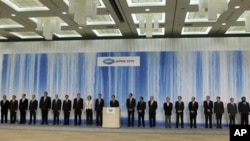Leaders of the Asia Pacific Economic Cooperation agreed to take significant steps towards a larger free trade zone, while working together to improve the region's economy. The APEC declaration came at the end of two-day leaders summit.
Asia Pacific Economic Cooperation leaders came in to the two-day summit with hopes to expand free trade and boost economic growth. On Sunday, they took a significant step, with an agreement that committed APEC countries to a regional free-trade zone involving all 21 members.
The so-called "Yokohama Vision" did not give a timetable for that trade pact, but it called for ongoing discussions through forums like ASEAN plus three or six.
|
Charles Morrison, President of the East-West Center in Hawaii, talks about the APEC summit with VOA's Les Carpenter |
The United States sees its Trans Pacific Partnership as an important vehicle to drive APEC's larger goal. The trade pact proposes lifting import tariffs on nine developed countries, including Japan. But the host nation has been reluctant to commit, concerned about political backlash from domestic farmers opposed to free trade.
Speaking at a news conference, Japanese Prime Minister Naoto Kan stopped short of endorsing the plan.
He said the TPP has become a symbol for economic growth in the nine countries involved. While Japan has not signed on to it yet, we plan to aggressively meet with member countries to decide the right course of action.
The APEC declaration also laid out steps to boost regional economies. Leaders stressed balanced growth and deeper economic cooperation. They emphasized boosting domestic wages and focusing on domestic demand.
Member nations also committed to fighting protectionism and resisting any new trade barriers over the next three years. And they vowed to complete the Doha round of World Trade Organization talks - aimed at increasing global trade.
The renewed commitment to trade and economic cooperation is seen as a significant development, in part because APEC countries produce more than half of the world's gross domestic product.
Still unresolved - currency policies and bilateral tensions between APEC countries.
Japan has been locked in a heated debate with Russia since President Dmitry Medvedev visited disputed islands, against the Japanese government's wishes.
Sino-Japanese relations plummeted this fall, after a Chinese fishing boat captain rammed a coast guard ship off disputed islands Tokyo controls.
Mr. Kan met with Russian and Chinese leaders during the summit, but he said the territorial debate remained unresolved.
Despite our difference, he said, Japan can improve relations with these countries by focusing on common ground. Economic cooperation is one area that can help us overcome these tensions.
The focus now shifts to the United States - where Hawaii hosts the next APEC summit, next year.




